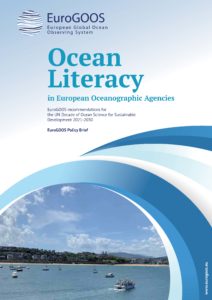 Our new policy brief gives recommendations on how to enhance Ocean Literacy activities in oceanographic agencies. The extent of the activities dedicated to increasing public engagement and awareness carried out by these organizations, whose core mandate is mainly linked to scientific and technological aspects of ocean data and services, calls for a stronger voice for Ocean Literacy as a recognized and active force in today’s oceanography.
Our new policy brief gives recommendations on how to enhance Ocean Literacy activities in oceanographic agencies. The extent of the activities dedicated to increasing public engagement and awareness carried out by these organizations, whose core mandate is mainly linked to scientific and technological aspects of ocean data and services, calls for a stronger voice for Ocean Literacy as a recognized and active force in today’s oceanography.
From local and national to global levels, Ocean Literacy enables science to engage with policy and society on the topics of ocean sustainability, observations and research, and the importance of oceanography. EuroGOOS has been showcasing and connecting the variety of Ocean Literacy competences among its members and partners. The brief was developed from the work of the EuroGOOS Ocean Literacy Network and a survey the network conducted across 11 organizations in Europe. The survey unveiled an outstanding diversity of activities, demonstrating that Europe is advancing towards making Ocean Literacy part of the mandate of oceanographic agencies and meteorological offices.
The success of the United Nations Decade of Ocean Science for Sustainable Development 2021-2030 will rely on sustained and fit-for-purpose ocean observing and derived oceanographic information and services. Ocean Literacy tools and approaches are needed to increase societal and policy awareness of the needs, challenges, and opportunities of the ocean observing enterprise. Furthermore, Ocean Literacy is important for achieving sustained operations and funding of the ocean observing systems, maintained predominantly by public funding.















































